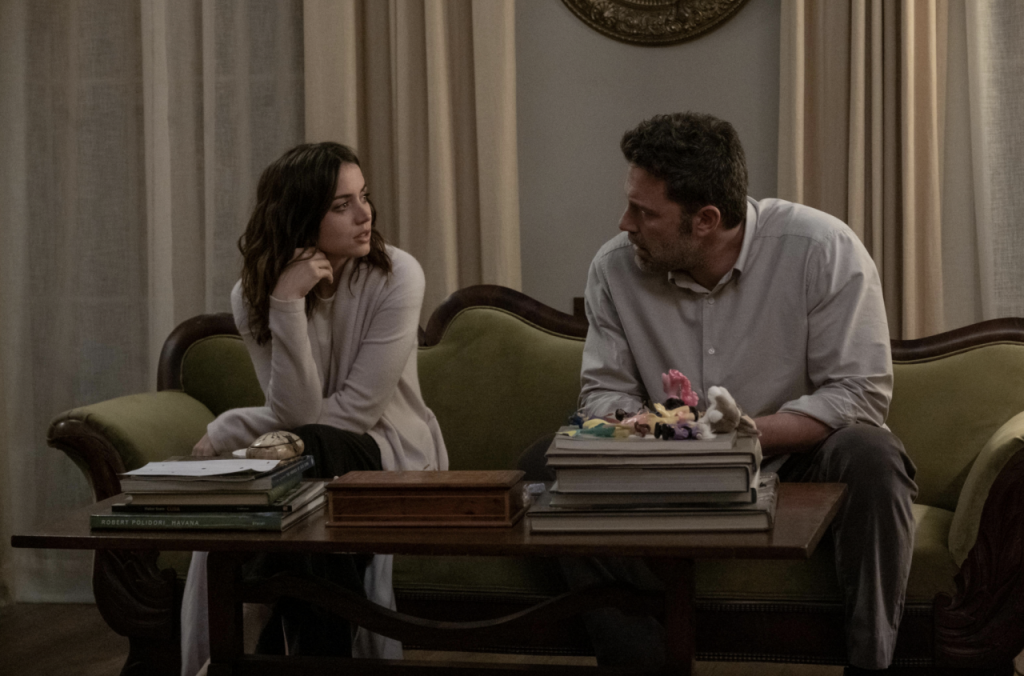Comment by Deep Water: Support your wife to have an affair

He was tired of her body, she was tired of his coldness and his thoughtfulness. A marriage that is tired of each other, sinks as a bubble and rises as a corpse. The corpse of a love that once existed but is impossible to get back.
Of course, the film is by no means useless, and the viewing experience depends directly on what you expect from it. Bed scenes? Take off a pair of pants and there may be none. Crime? Full of holes and still not caught by the police. Given that the director is Adrian Lyne, who made [A Tree of Pears], it’s okay to look at freakish emotions and incestuous relationships.

Anyway, the desire, tug of war and calculation between a sick couple, [Deep Water] is shot out. One Life, One Life, One Pair seems to be an old romance. The modern man who plays it cool says it’s so against human nature. [Deep Water] provides an extremely scientific sample of controlled variables, shaving off the realities that a marriage relationship may encounter, and what remains may be the truth about marriage. Looking down the road, there is nothing to envy in a marriage between a handsome man and a beautiful woman with money and leisure.
It boils down to the two most lifeless words of an ordinary couple – “What’s wrong?” “Nothing.” When the passion fades, couples who love each other again may look at each other with disgust and not even want to talk to each other. The [deep-water] couple’s response was an open marriage, sleeping in separate rooms, each playing their own game and not interfering with each other. From the beginning, however, they were out of balance. Only Melinda, the gorgeous, petite wife, plays outside alone, and Vic, the husband, only burrows in the foggy little room to play snails. Sympathetic viewers will basically scream for Vic, because he is really the model husband representative. He is the one who doesn’t let his wife do the housework, he is the one who makes coffee for her every morning, and he is the one who takes his daughter to kindergarten with an “I love you” message. Even when he heard the news that one of his wife’s lovers had died, he put the bath water on her before he started to be shocked. The problem with the two wives is that their needs don’t match each other.
Melinda is one of those natural romance addicts, energetic, fresh and thrill-seeking. She can just throw her shoes at a party and climb up on the piano and dance. Vic, on the other hand, is a woody and, in her words, “so bored that he wants to kill himself”.
His only hobbies were playing with snails and riding bicycles, he was sexually uninterested in anyone, and his mood never rose. Melinda used to do everything she could to seduce him, wearing sexy clothes in front of him, hooking her legs and asking him to help her put on her high heels.
But each time, Vic behaved like a live-in male babysitter, leaving her to make a fool of herself. Scientific studies have shown that the human urge for romantic love is controlled by the most primitive region of the human brain, next to the reflex areas of thirst and hunger. The couple’s love brain is one active and one depleted, so it’s no wonder they can’t play together.
Melinda’s cheating is more or less revenge on her husband, she will be in the presence of her husband in public, recklessly hooking up with fresh meat. In the presence of her husband, she would play, hug, and kiss all under his watchful eye. Sometimes Vic got up and made his usual coffee and gave it to her to drink, only to find that she hadn’t returned all night.
After pouring out the coffee and sitting for a long time, he waits for his wife who looks tired but happy. He helped his wife take off her high heels and gave her a massage for her leg muscles, while she was talking about which part of her body her lover had left hickeys on. This bizarre couple also reached a bizarre tacit agreement.
Melinda would bring her lover home, usually with Vic cooking, and the four of them would share a meal. Afterwards, Melinda would duly rush her daughter to bed, her husband to read her a bedtime story, and instruct her daughter, “Don’t let Daddy skip pages, he might sneak in and do that.”
She cleared the room of “strangers” so she could go on a date with her lover. By the time Vic had put her daughter to sleep, Melinda and her lover were almost finished. The process is basically fixed, and after each invitation to the house, Melinda breaks up with her lover, who is often more handsome. Intimacy researcher Esther Perel put it well when she said, “Infidelity has a resilience that marriage can only envy.”
If Vic really went against the grain like that, the movie wouldn’t be much fun to watch. In fact, it’s not in human nature to share a partner. The existence of jealousy makes open marriage a false proposition. Biological anthropologist Helen Fisher once surveyed 5,000 Americans, 68% of whom were in favor of plural love, but only 6% actually practiced it, and most of them ended up in failure. Vic initially agreed to cheat on his wife with the idea of keeping the marriage together. At the party, Vick’s friends watched Melinda and the young man hit it off and were indignant on his behalf. At that time, he was still tough and said “I don’t care” with a carefree face.
The lightness of words is light, his eyes at any time to follow the trail of Melinda. When he saw his wife kissing with a young man in the corner, he turned his head and scared the young man that he had killed someone. At this stage his jealousy is still at the level of a small whine. After putting his daughter to bed, if his wife and lover had not come out of the room, he would run to the kitchen and clink the plates. Then in between his wife coming out to pour the wine, he would call her lover a cab to remind him it was time to go. Later he began to actively detect Melinda’s movements, knowing what venues she was dating her lover, who she was learning piano from, and who gave her the bouquet of flowers on the family dinner table.
He finally couldn’t help but lose his temper with his wife who hadn’t come home all night. Melinda, bent on arching fire, takes her orgasm with her lover to task, accusing the couple of having no passion. She threatens Vic with divorce, the equivalent of stabbing him hard in the soft spot. So, Vic really started killing people.
Melinda and her lover were playing in the pool, and he sat by the pool watching, waiting for the rain to pour down and then drowning her lover in the water. This is his first transgression, alone, his mind alternately flashed two scenes. One is the imaginary scene of his wife and lover making love, and the other is the scene of him trying his best to drown his lover.
He was weak-minded, but never showed it in front of anyone, and even fooled the lie detector. But Melinda quickly hooked up with her pre-marriage lover again, and was planning to run away with him with her daughter. This guy is a know-nothing and comes to the couple’s house as a guest, and even threatens to eat Vic’s snails. Vic is even more crisp this time, tricking him into going deep into the woods and sinking his body in the river by stoning him to death.
The 1981 version of [Deep Water] speaks directly to Vic’s psychological activities with the line, “How can it be that you are so happy without me.”
From threatening to kill to putting it into practice, the couple counts themselves as accomplices. Marriage is a deep water, which can escape from the open stream, but not from the dark. And jealousy is the undercurrent of their tug-of-war. At some stage before Vic’s murderous mood, he tried to learn his wife to have an affair with a married woman at a party, dancing in a way he never could. This really aroused Melinda’s jealousy and made out with him for a night after a long time. But what he didn’t expect was that Melinda had already found a new lover by that time.
Perhaps he figured out then that since he had no more passion for his wife, he would prove his love for her by killing her. Even if he was jealous and furious, he could not have touched a hair on his wife’s head. In this point, Melinda took him to death. By telling various details, she kept stimulating her husband to be jealous of her lover, just hoping to arouse his lust and complete the mysterious sex. She knew he could not possibly hurt him. She suspected that her husband had killed someone, but instead she was convinced of his love for her. “I am not afraid, because I am the reason you killed him.” It wasn’t that Melinda hadn’t thought about leaving her husband, but one lover after another had left her for a variety of reasons, convincing her that no one could be as long-suffering as her husband.
The human brain is strange in that it can be intensely in love with one person while being deeply attached to another. The need for both excitement and peace of mind contradicts each other, but marriage at least guarantees the latter. Melinda understood this in her daughter. After finding evidence of Vic’s murder, her first reaction was to pack her bags and take her daughter to escape. But her daughter took advantage of her inattention and threw the suitcase directly into the pool. The daughter did not want to leave her father, and her mother could not leave her daughter behind no matter what.
Marriage is the most adaptable family that can stick together three people. “Like bamboo, the wind gives way to the wind, the wind over and straighten the back.” But a marriage with no passion still attached, a marriage to be maintained by jealousy, too stifling and too sick. Nothing will change. The movie ends back where it began, with Melinda sitting on the stairs, waiting for Vic to return from his bike ride. “What’s wrong?” “Nothing.” He’s tired of her body, she’s tired of his coldness, and she’s tired of his thoughtfulness.
A marriage that is tired of each other, sinking as a bubble and rising as a corpse. The corpse of a love that once existed but is impossible to retrieve.
